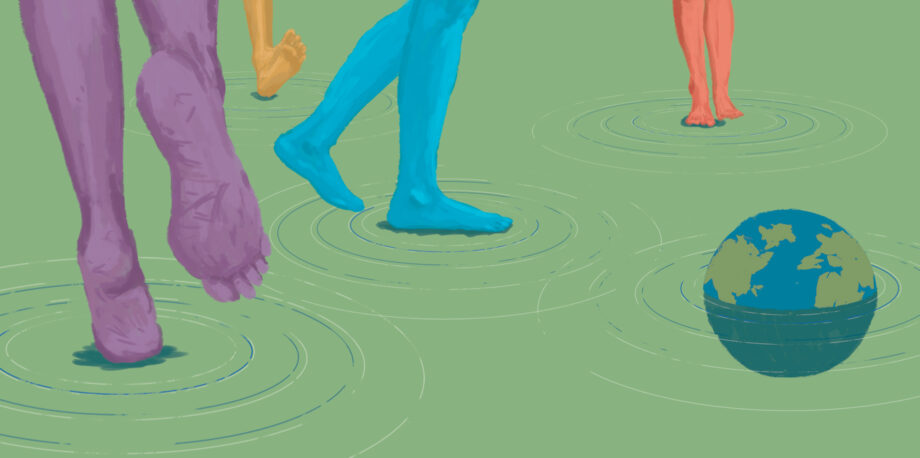December 6, 2019 —  There is one statistic easing pangs of guilt for people who feel they are not doing enough to fight climate change: About 71% of greenhouse gas emissions from 1988 to 2015 came from only 100 companies. Increasingly, the message is: Stop worrying about yourself and take the fight to the corporations and policymakers who refuse to stop them!
There is one statistic easing pangs of guilt for people who feel they are not doing enough to fight climate change: About 71% of greenhouse gas emissions from 1988 to 2015 came from only 100 companies. Increasingly, the message is: Stop worrying about yourself and take the fight to the corporations and policymakers who refuse to stop them!
But you’re not off the hook yet. Individual action matters for a number of reasons: It stimulates and supports social action. It is central to honoring our moral duties to respect life. And it can be a force for social change in subtle or unexpectedly powerful ways.
Here are four arguments to keep riding your bike and doing all the other green things that each of us should do.
Argument 1: It’s Them and Me
It is disempowering to realize that most of the harm from climate change primarily comes from relatively few actors. In the face of this knowledge, it would seem, our individual actions don’t really change a thing. Social change, on a massive scale, is what we need. As author Derrick Jensen bluntly states in his essay, “Forget Shorter Showers”: “Personal change does not equal social change.”
He’s right, but only to a point. In fact, the individual and the social are intertwined in two crucial ways. First, enough individuals making changes does equal social change. And individual actions can have a ripple effect that we should not discount.
Indeed, there is no avoiding the most catastrophic effects of climate change without major changes on a global scale. But that starts with campaigning and voting for politicians who will act on climate change, shopping less and more ethically, and doing what you can to disrupt business as usual.
Each of our behaviors affects those close to us. People have a strong desire to fit in and build bonds with like-minded people. Once two of my friends installed solar panels, I did, too. Hopefully, when people see the panels on my roof, they will consider it as well. Everything we do is a signal to others about how we think the world should be.
Second, collective action doesn’t happen without individual action. Jensen is right that, “Consumer culture and the capitalist mindset have taught us to substitute acts of personal consumption (or enlightenment) for organized political resistance.” What we really need to do, he argues, is to confront and take down the political systems that have gotten us into such a situation.
Indeed, there is no avoiding the most catastrophic effects of climate change without major changes on a global scale. But that starts with campaigning and voting for politicians who will act on climate change, shopping less and more ethically, and doing what you can to disrupt business as usual. In other words, social change starts with you.
Argument 2: It’s Just the Right Thing to Do
Even if you learned that turning off the lights when leaving a room will not make a measurable difference in reducing climate change, would you then feel free to leave lights on all the time? If you truly believe that doing so is wasteful, then probably not.
Most people’s moral sensibilities tell them that we have an obligation to do the right thing, even if nobody else does it or its impact is small. And the right thing to do is to respect other life forms and not waste resources, as you are able.
The upshot is that our small acts absolutely can make a difference in unexpected and possibly powerful ways.
Our moral responsibilities may also extend to future generations. Philosophers may quibble about such things, but ask yourself this: Even if your grandchildren aren’t born yet, would they be out of line to blame you for not doing what you could have done to protect our planet?
It is a matter of moral integrity. If you are not willing to live in a way that is true to your convictions and invite others to do so as well, who will? The right thing to do is the right thing to do. Period.
Argument 3: Be a Rock in the River
One hopeful metaphor for thinking about the effects of our actions comes from philosopher Kathleen Dean Moore. Just as particles in a river can combine to change its course, our “small” acts can alter the course of climate change.
In life, as in rivers, everything changes. To quote Moore: “Our work and the work of every person who loves this world — this one — is to make one small deflection in complacency, a small obstruction to profits, a blockage to business-as-usual, then another, and another, to change the energy of the flood.”
The upshot is that our small acts absolutely can make a difference in unexpected and possibly powerful ways. Our individual choices join with others’ choices to disrupt the flow of destructive ways of living. Small acts are a witness, inspiring others and contributing to a momentum of change that can trigger a social change faster than we anticipate. That’s what we need. Soon.
Argument 4: Channel Your Inner Greta Thunberg
Once in a while someone comes along who dispenses with the calculus of whether their sacrifices will amount to a hill of beans and just says, “Enough!” And thank God. One such person is the Swedish teen activist Greta Thunberg.
I’m guessing she — or other young activists who came before her — has little time for those who say that individual choices don’t matter in the grand scheme of things. Who would have thought that one schoolgirl sitting on the steps of the Swedish parliament building every Friday with a simple sign would change the world? Good thing she didn’t let the “smallness” of her individual act discourage her. The world is changed because she sat — alone.
Sometimes you just have to shrug off all the moral calculus and just say enough.
Some of us choose to bury our heads in the sand and continue shopping. Some of us make halting steps as an increasingly grimmer picture of future life for our children emerges.
But sometimes you just have to shrug off all the moral calculus and just say, “Enough.” Will my solar panels make enough of a difference to justify my sacrifice in buying them? Stop thinking. Just take action now.
The Upshot
We all must do what we can — in our homes, our communities and our countries. Writing in Orion Magazine years ago, author and climate activist Bill McKibben captured the “both-and” approach we need: “If 10 percent of people, once they’ve changed the light bulbs, work all-out to change the system? That’s enough. That’s more than enough.”
Related Posts
Ensia shares solutions-focused stories free of charge through our online magazine and partner media. That means audiences around the world have ready access to stories that can — and do — help them shape a better future. If you value our work, please show your support today.
Yes, I'll support Ensia!





Much as I would like to strip the assets from those companies that have profited most from the industrial revolution that the exploitation of coal, oil and gas enabled, and redistribute them to the poor who now face the consequences of the climate change it caused, this would significantly miss the point.
The root problem is our constant desire for more material possessions.
80% of the UK emissions are embodied in products and services that we, the citizens of the UK, either directly, or indirectly purchase. The UK has exported most of its industry so about half UK emissions are emitted overseas and embodied in imports, but they are still caused by UK citizens' purchase decisions.
It will be similar picture in the USA, most of Europe, OECD countries and most of the Eastern tiger economies of which China is the most recent addition, although they still have 30 years of (internal) growth to come.
Contrary to your argument, it is our choices of continually purchasing new material possessions that is driving climate change.
We can and need to take immediate action to change our purchase choices.
Professor Tim Jackson (Prosperity without Growth p58) quotes the Subjective Wellbeing comparison to GDP per capita (Robert Ingerhart, 2008) to show that we could substantially reduce our affluence without significantly reducing our subjective wellbeing. And GDP and emissions embodied in consumption go hand in hand.
The IPCC advise emissions must be cut 45% of 2010 levels by 2030 to give us a chance of limiting climate change. In the UK we have (by switching from coal and investing in renewable electricity) reduced emissions by 10%. If 100% of electricity was renewable we would reduce by a further 7%, which is nowhere like enough. If we were to reduce consumption by 1/3rd we would achieve the IPCC target by:
19% by 1/3rd reduction in purchases
4% by insulating 1/3rd of homes and offices
3% by switching 1/3rd to electric (or less use of) cars and busses
2% by 1/3rd less air miles
So why are we not broadcasting this?
Even XR don't mention it
It is time to be blunt, we have to be if we are to avoid the consequences of climate change, and we can act on this rapidly.
Let us campaign for governments to label all products and services with the greenhouse gas emissions they are responsible for. Green for 'negligible' emissions, Yellow for 'acceptable' emissions, Red for 'too much' emissions, so we can choose 'Green' products before 'Yellow' products and limit our purchases of 'Red' products.
Let us campaign so governments ensure all products are made more durable, with spares and repair manuals, so we can extend the lives of the possessions we choose to have, and pass them on when we want a change, not wasting them or throwing them away.
If they lasted another 50% longer, we could reduce our purchases by 1/3rd and meet the IPCC target of reducing emissions 45% of 2010 levels by 2030.
And let us campaign to reduce purchases 1/3rd by 2030.
Best regards
David Brockington
MSc Renewable Energy in the Built Environment (2011)
Retired Engineer